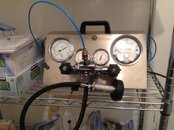sorry, but I have a problem with this.. personally.
Sorry, I dont want to "flame" on this, but i have a personal problem with this.. "Unfortunately regulator issues can often show themselves right after maintenance. Test dives are often warranted after maintenance". This is why "we" take them is for service. If I cannot trust the work that supposed technicians perform, what is their value ? I have had equipment come back with hoses rerouted, BCD, and high pressure hoses not installed properly. This is garbage work. If these folks are to be trusted with life support, they need to perform this work with some measure of expertise. I'd do the work myself if I could get the parts, but manufactures wont sell it to "amateurs". You manufacturers know who I'm talking about. The last 4 times I've taken my gear to a shop (or sent in in..i.e., different shops) it had come back with operational issues. Opting for 1-2 hour "training" sessions via sales folks at DEMA or at a shop. Obviously, I feel very strongly about this as my life is on the line for baseline work. The last 4 times I've taken my gear to a shop (or sent in in..i.e., different shops) it had come back with operational issues. Why should I, after having my gear worked on by a "professional" have to find time to take said gear to a pool, go maybe 10 feet and declare "all is good" and then sink 95-100' into the darkness of a quarry ? The only time my gear has breathed correctly is when it was new. and that is from the "big" 2 or 3 and when I have even sent it back to factory for service ! Yes, I know they opt for soncervatism when adjusting crack and such, but not putting on a HP hose even past the o-ring ? Really ?




